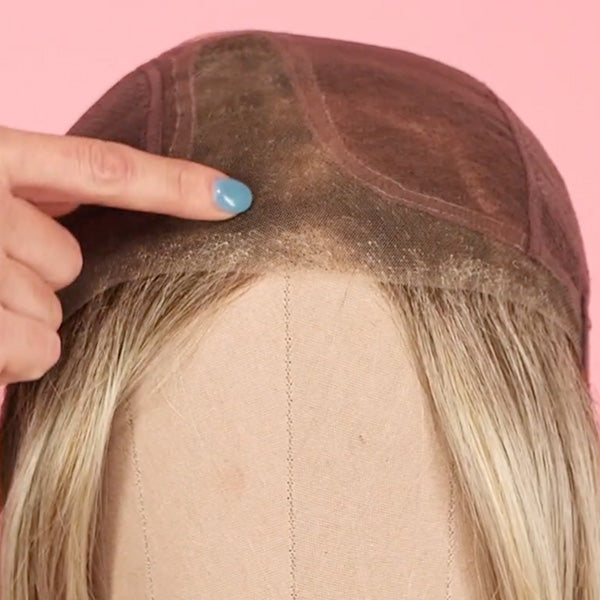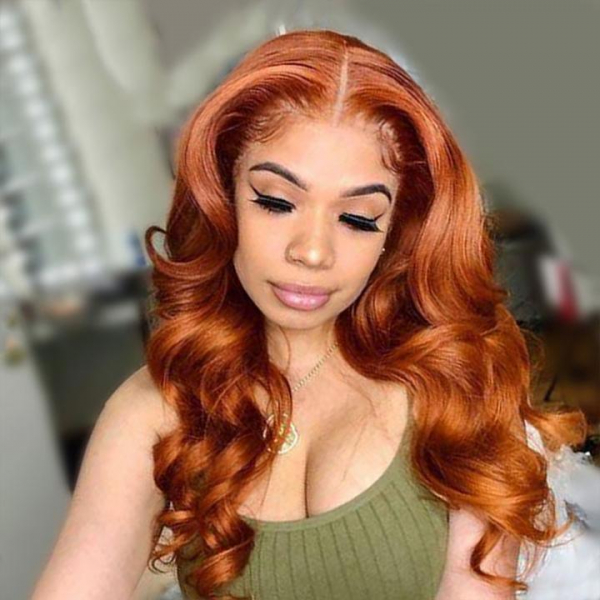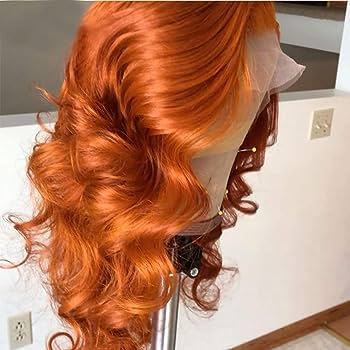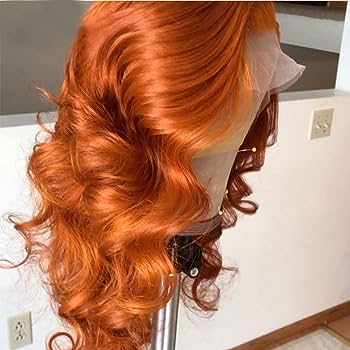I know you’ve been wondering if it’s possible to wear a ginger wig if you have a sensitive scalp. Well, the good news is that I have some information that might help you with your decision. In this article, we’ll discuss the factors to consider when choosing a wig for a sensitive scalp, as well as whether a ginger wig could be a suitable option for you. So, if you’re planning to switch up your look and want to explore the world of wigs, keep reading to find out more!
If you’re curious about the answer to the question of whether you can wear a ginger wig with a sensitive scalp, you’re in the right place. In this article, we’ll delve into the topic and provide you with some valuable insights. We understand that having a sensitive scalp can be challenging, but don’t worry, there are solutions that can help you find a wig that suits your needs. So, get ready to learn more about choosing a wig for a sensitive scalp and whether a ginger wig could be the right choice for you! Choosing a wig for a sensitive scalp can be a daunting task. You want to find a wig that not only looks great but also feels comfortable and does not irritate your scalp. One popular option to consider is a ginger wig. Ginger wigs offer a natural and flattering appearance, and they can be a good match for different skin tones. In this article, we will explore the considerations for sensitive scalps, the benefits of wearing a wig, the different types of wigs available for sensitive scalps, and specifically, the characteristics and benefits of ginger wigs. So let’s dive in and find out if a ginger wig is the right choice for you!
Considerations for Sensitive Scalps
If you have a sensitive scalp, it’s important to take certain factors into consideration before choosing a wig. Here are some key considerations:
Identifying a Sensitive Scalp
It’s essential to identify whether you have a sensitive scalp or not. Signs of a sensitive scalp can include itching, redness, irritability, or a burning sensation. If you experience any of these symptoms, it’s recommended that you consult with a dermatologist to determine the cause and find suitable solutions.
Causes of Scalp Sensitivity
A sensitive scalp can be caused by various factors, such as allergies, chemical irritants, or environmental factors like extreme weather conditions. Understanding the cause of your scalp sensitivity can help you make more informed decisions when it comes to wig selection.
Importance of Gentle Materials for Wigs
When choosing a wig for a sensitive scalp, it’s crucial to select one made from gentle materials. Look for wigs that use soft and breathable fabrics, as they will be less likely to cause irritation. You should also avoid wigs constructed with harsh chemicals that could further aggravate your scalp.
Now that we know the considerations for sensitive scalps, let’s explore the benefits of wearing a wig.
Benefits of Wearing a Wig
Wearing a wig can offer numerous benefits, especially for individuals with sensitive scalps. Let’s take a look at some of the key advantages:
Enhancing Self-Confidence
One of the significant benefits of wearing a wig is the boost it can provide to your self-confidence. A wig can help you achieve the hairstyle you desire, allowing you to step out with a renewed sense of self-assurance. Whether you choose a wig that matches your natural hair or opt for a completely different style, the ability to transform your appearance can have a positive impact on your confidence levels.
Versatility in Hairstyles
Another advantage of wearing a wig is the versatility it offers in terms of hairstyles. With a wig, you can easily switch between different looks and experiment with various hairdos. Whether you want to try long flowing locks, a chic bob, or a trendy pixie cut, wigs provide you with the freedom to explore different hairstyles without committing to a specific look.
Protection for Sensitive Scalps
For individuals with sensitive scalps, wearing a wig can provide an additional layer of protection. A wig acts as a barrier between your scalp and any external irritants, such as the sun or harsh weather conditions. It can help shield your scalp from potential damage while still allowing you to enjoy different hairstyles and express your personal style.
Now that we understand the benefits of wearing a wig, let’s explore the types of wigs that are suitable for sensitive scalps.

Types of Wigs for Sensitive Scalps
Not all wigs are created equal when it comes to sensitive scalps. Here are the three primary types of wigs that are particularly suitable:
Synthetic Wigs
Synthetic wigs are a popular choice for individuals with sensitive scalps. They are typically made from synthetic fibers designed to mimic the look and feel of natural hair. Synthetic wigs are lightweight, easy to maintain, and usually more affordable than other types. However, it’s important to choose high-quality synthetic wigs that are specially designed for sensitive scalps, as some synthetic materials can cause allergic reactions or scalp irritation.
Human Hair Wigs
For those seeking the most natural-looking option, human hair wigs are a great choice. These wigs are made from real human hair, which allows for a more realistic appearance and texture. Human hair wigs can be treated, styled, and colored just like your natural hair. However, they do require more care and maintenance compared to synthetic wigs.
Lace Front Wigs
Lace front wigs are a popular option for individuals with sensitive scalps because they provide a natural-looking hairline. The lace front is designed to blend seamlessly with your skin, giving the illusion of hair growing directly from your scalp. This type of wig offers versatility in styling and allows for off-the-face hairstyles. However, proper application and regular maintenance are crucial to ensure a comfortable fit and prevent irritation along the hairline.
Now that we have covered the types of wigs suitable for sensitive scalps, let’s delve deeper into ginger wigs.
Understanding Ginger Wigs
Ginger wigs have gained popularity in recent years due to their unique and eye-catching appearance. But what exactly are ginger wigs?
What are Ginger Wigs?
Ginger wigs are wigs that feature a warm, red or reddish-brown hair color resembling the shade of ginger, hence the name. They come in various lengths, styles, and shades of ginger, allowing individuals to choose a wig that matches their preferences and skin tone.
Characteristics of Ginger Wigs
Ginger wigs are known for their vibrant and natural-looking hair color. They can range from lighter, more copper-toned shades to darker, richer shades, depending on the desired look. Ginger wigs can be found in different styles, including straight, wavy, curly, and even afro-textured, providing options for various hair textures.
Popular Styles in Ginger Wigs
Ginger wigs offer a wide range of popular styles to suit different preferences. Some popular styles include long, flowing ginger locks for a romantic look, short and sassy ginger bobs for a chic appearance, or even ginger wigs with bangs for a trendy and youthful vibe. The versatility of ginger wigs allows you to find a style that complements your face shape and personal style.
Now that we have a better understanding of ginger wigs, let’s explore the benefits they offer for individuals with sensitive scalps.

Benefits of Choosing a Ginger Wig
Ginger wigs can be an excellent choice for individuals with sensitive scalps. Here are the key benefits of opting for a ginger wig:
Natural and Flattering Appearance
Ginger wigs provide a natural and flattering appearance that can enhance your overall look. The warm tones of ginger hair can complement a variety of skin tones, making it a versatile and attractive choice. Whether you have fair, medium, or deep skin, there is a shade of ginger that will suit you beautifully.
Blending with Different Skin Tones
One of the standout benefits of ginger wigs is their ability to blend seamlessly with various skin tones. Ginger hair color can range from light to dark shades, making it easier to find a perfect match for your complexion. Ginger wigs can add warmth and radiance to your face, creating a harmonious and balanced look.
Preventing Irritation on Sensitive Scalps
For individuals with sensitive scalps, irritation can be a constant concern. Ginger wigs, especially those made from high-quality and gentle materials, can provide relief by reducing scalp irritation. Opting for a ginger wig made from soft and breathable fabrics can help minimize discomfort and enable you to wear your wig with greater ease.
Now that we know the benefits of choosing a ginger wig, let’s explore how to match a ginger wig to your skin tone.
Matching a Ginger Wig to Your Skin Tone
Finding the right shade of ginger that complements your skin tone is crucial for achieving a natural and harmonious look. Here are some steps to help you determine the best ginger wig shade for your unique skin tone:
Determining Your Skin Tone
First, you need to determine your skin tone. There are usually three main categories: warm, cool, and neutral. Warm skin tones typically have golden or peach undertones, cool skin tones have pink or bluish undertones, and neutral skin tones have a balanced mix of warm and cool undertones.
Finding the Right Shade of Ginger
Once you have identified your skin tone, you can start exploring the different shades of ginger that will work best for you. If you have warm undertones, opt for rich, coppery shades of ginger that will enhance your natural warmth. For cool undertones, go for cooler, strawberry blonde shades of ginger that will complement your complexion. If you have neutral undertones, you have more flexibility to experiment with both warm and cool shades of ginger.
Tips for Color Matching
When color matching your wig to your skin tone, consider trying on different shades of ginger wigs in natural lighting. This will give you the most accurate representation of how the color interacts with your complexion. Additionally, you can consult with hairstylists or wig specialists who can provide expert advice on selecting the perfect shade.
Now that we have covered the specifics of matching a ginger wig to your skin tone, let’s explore some common causes of scalp sensitivity.

Identifying a Sensitive Scalp
Before diving into the causes of scalp sensitivity, it’s crucial to identify if you have a sensitive scalp or not. Here are some signs that may indicate scalp sensitivity:
Signs of Scalp Sensitivity
- Itching: Constant or recurring itching on the scalp can be a sign of scalp sensitivity.
- Redness: If your scalp appears red or irritated, it may be a result of scalp sensitivity.
- Irritability: Feelings of discomfort or tenderness on the scalp can be a symptom of a sensitive scalp.
- Burning Sensation: A burning sensation on the scalp, even without any visible signs, may indicate scalp sensitivity.
If you experience any of these symptoms, it’s important to consult with a dermatologist to determine the cause and find suitable solutions.
Common Triggers for Scalp Sensitivity
Scalp sensitivity can have various triggers. Here are some common culprits:
- Allergic Reactions: Certain ingredients in hair care products, such as sulfates, fragrances, or preservatives, can trigger allergic reactions that result in scalp sensitivity.
- Chemical Irritants: Chemical treatments like hair dyes, relaxers, or perms can cause scalp irritation and sensitivity, especially if your scalp is already prone to sensitivity.
- Environmental Factors: Extreme temperatures, sun exposure, or pollution can contribute to scalp sensitivity. Dry or humid weather conditions can also exacerbate scalp irritation.
It’s essential to identify the specific triggers that cause your scalp sensitivity to take appropriate steps in wig selection and overall scalp care.
Causes of Scalp Sensitivity
Understanding the causes of scalp sensitivity can help you make more informed decisions when selecting a wig. Here are some common causes:
Allergic Reactions
Allergic reactions to hair care products, including shampoos, conditioners, and styling products, can lead to scalp sensitivity. Certain ingredients, such as sulfates, parabens, or fragrances, may cause an allergic response in some individuals. If you suspect that you have a product allergy, it’s important to read the ingredient labels carefully and avoid products that contain known irritants.
Chemical Irritants
Chemical treatments like hair dye, relaxers, or perms can strip your scalp of its natural oils and disrupt its sensitive balance, resulting in irritation and sensitivity. If you’ve experienced scalp reactions after chemical treatments in the past, it’s advisable to approach them with caution and consider gentler alternatives.
Environmental Factors
Extreme weather conditions, such as extreme heat or cold, can cause scalp sensitivity due to dehydration or exposure to harsh elements. Sun exposure can also worsen scalp sensitivity and potentially contribute to scalp dryness. Wearing a hat or using a wig can provide protection and help mitigate the effects of these environmental factors.
With the causes of scalp sensitivity in mind, let’s explore why gentle materials in wigs are so important.

Importance of Gentle Materials for Wigs
When it comes to sensitive scalps, opting for wigs made from gentle materials is essential. Here’s why:
Choosing Soft and Breathable Fabrics
Wigs made from soft and breathable fabrics, such as high-quality synthetic fibers or natural human hair, are less likely to cause scalp irritation. These materials allow air to circulate and prevent excessive heat and sweat build-up, reducing the risk of discomfort and scalp sensitivity.
Avoiding Harsh Chemicals in Wig Construction
Harsh chemicals used in the construction of wigs can exacerbate scalp sensitivity. When choosing a wig, look for ones that are free from toxic substances like formaldehyde or heavy metals. Additionally, selecting wigs made from hypoallergenic materials can minimize the risk of allergic reactions and scalp irritation.
Features to Look for in Sensitive Scalp Wigs
There are certain features you should look for specifically in wigs designed for sensitive scalps. These include:
- Double-lined caps: Wigs with double-lined caps offer an extra layer of protection and comfort for the scalp.
- Adjustable straps: Wigs with adjustable straps allow for a customized fit, ensuring maximum comfort and reducing scalp irritation.
- Hand-tied construction: Hand-tied wigs feature individually hand-tied hairs, providing a more natural and lightweight feel on the scalp.
Now that we understand the importance of gentle materials in wigs, let’s revisit the benefits of wearing a wig.
Enhancing Self-Confidence
One of the significant benefits of wearing a wig is the boost it can give to your self-confidence. Being able to achieve the hairstyle you desire and feel comfortable in your own skin can have a positive impact on your overall confidence levels. Whether you’re trying to replicate your natural hair or experimenting with a completely different look, wearing a wig can help you present yourself confidently to the world.

Versatility in Hairstyles
Wigs offer unparalleled versatility when it comes to hairstyles. With a wig, you can easily switch between different lengths, colors, and styles without having to commit to a specific look. This versatility allows you to explore different aspects of your personality and express your creativity through ever-changing hairstyles. Whether you want to rock long flowing locks one day and a sleek bob the next, wigs provide you with the flexibility to change up your look whenever you please.
Experimenting with Different Looks
Trying out new hairstyles can be both exciting and empowering. With a wig, you have the freedom to experiment with different looks without undergoing any permanent changes to your natural hair. Whether you’re looking to try out a new hair color, texture, or length, wigs provide a risk-free way to explore and discover the styles that make you feel most confident and beautiful.
Switching Between Short and Long Hair
One of the advantages of wearing a wig is the ability to switch effortlessly between short and long hair. If you’ve always had short hair and want to experiment with longer locks, or if you’re tired of lengthy maintenance routines and want to rock a short, low-maintenance style, wigs can make it happen. You can alternate between different lengths and styles to suit your mood and preferences at any given time.
Accessorizing Your Wig
Another fun aspect of wearing wigs is the ability to accessorize them. From headbands and scarfs to clips and bows, accessories can instantly elevate your wig and complete your look. Experimenting with different accessories allows you to add a personal touch to your wig and make it feel uniquely yours.
Conclusion
Choosing a wig for a sensitive scalp is an important decision that requires careful considerations. Ginger wigs offer a natural and flattering appearance, making them a great option for individuals with sensitive scalps. From their ability to blend with different skin tones to their potential to prevent scalp irritation, ginger wigs offer numerous benefits. By matching a ginger wig to your skin tone and selecting one made from gentle materials, you can find a wig that not only looks great but also feels comfortable to wear. With the right wig, individuals with sensitive scalps can enhance their self-confidence, protect their scalp, and enjoy versatile hairstyles. So go ahead and explore the world of ginger wigs – you might just find the perfect match for your sensitive scalp and personal style!
